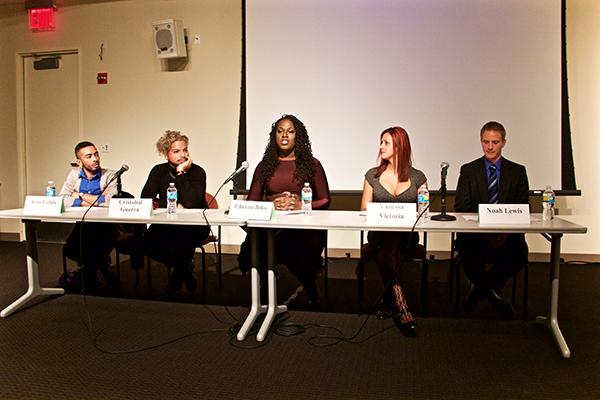Panelists talk state-sanctioned violence against trans individuals

State of the Union: Panel on State Violence Against Trans Individuals took place on Tuesday and addressed the violence that Trans Individuals face.
November 18, 2015
In an effort to encourage discussion around the treatment of transgender people by authorities, a panel of transgender activists came together Tuesday night for the NYU LGBTQ Student Center’s “Panel on State Violence Against Trans Individuals” as part of NYU’s Trans Awareness Week.
The panel featured Aron Cobbs from Lambda Legal, Cristobal Guerra from the Queer Detainee Empowerment Project, Vanessa Victoria from New York City’s Anti-Violence Project and The Trans Women of Color Collective, Noah Lewis from the National LGBTQ Task Force and moderator Cherno Biko from the New York City Young Women’s Advisory Council and The Red Umbrella Project.
Each panelist is working toward ending state and state-sanctioned violence and oppression against transgender individuals, something Guerra said is disproportionately high. Guerra mentioned that violence can begin from the moment that someone is misgendered or a detainee is put into the wrong jail.
“There is a constant threat of state violence whether you are outside of a facility or inside a facility, and that looks like higher visibility for trans people,” Guerra said.
Some facilities have the option of special LGBTQ housing units, which only segregates the population more and can make the population more prone to physical attacks from guards.
The panel discussed legal representation for trans people and the stipulations attached to that, something Cobbs feels is a major issue in society today.
“The law has not sufficiently humanized trans people enough to the degree that they’re actually represented in our legal system,” Cobbs said. “The protections under the law such as the 14th Amendment or the equal protection clauses do not represent or include trans people.”
Biko said in some states, those who identify as LGBTQ are denied housing, education and employment. In order to pass legislation to fix the problems, some major LGBTQ organizations removed protections for trans people and focused solely on working around sexual orientation, thus leaving trans people defenseless.
CAS freshman Naomi Markman said she thinks that trans people are too often left out of the equation.
“Often, I think when LGBTQ is talked about, the ‘T’ gets left out,” Markman said. “I’m interested to see how the ‘T’ will turn out.”
The panel also discussed how even within the trans community there are further separations. Victoria explained how people tend to harass trans women with darker skin more than their lighter-skinned counterparts. The darker the skin of transgender individuals, the more danger they face.
Meanwhile, Lewis emphasized that white people are not removed from the equation and still should be doing what they can to support progress.
“If you’re doing LGBT activism or trans activism that doesn’t center racial and economic justice, you’re part of the problem,” Lewis said. “And so what we as white people need to do is shut up, and give money and power to organizations led by trans women of color.”
CAS senior Mohammed Khan said he is interested in becoming a proper ally of trans people despite not identifying as transgender himself.
“I had the opportunity to take advantage of hearing their narratives and becoming a better ally, so I took it,” Khan said. “If we silence the issue, no action can be taken. These people deserve a space.”
The NYU LGBTQ Student Center will hold events all week in honor of the Trans Day of Remembrance and Trans Awareness Week.
Email Farhin Lilywala at [email protected].


























































































































































